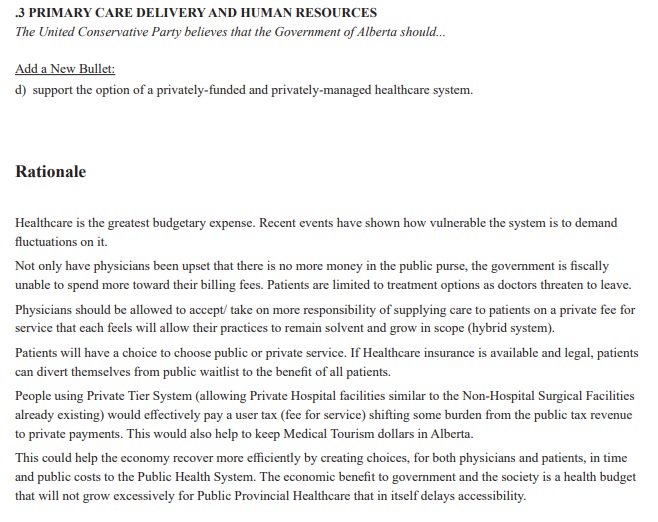
Some thoughts on Bill 46... This main changes are to the Hospitals Act, Health Information Act, and Health Professions Act. The Hospitals Act will be repealed and public hospitals will now be regulated in the Health Facilities Act (HFA) along with private surgical facilities.
Part 2 of the HFA addresses private facilities (both those who provide insured and those who provide uninsured services). This remains unchanged since the passage of bill 30.
There's a new Part 2.1 of the HFA. Basically, the gov plunked all of the old Hospitals Act (e.g. hospital bylaws, privileges, hospital foundations, etc) into the HFA.
Some of you were concerned about the powers of the Minister under Part 2.1 (e.g. Ministerial approval of med staff bylaws, appointment of a hospital administrator, appointment of Hospital Privileges Appeal Board, hospital inspections, etc).
While it is true that these are sweeping powers, they predated this gov (many have been in hospitals laws for decades). In other words, if there are concerns with the amount of power the Minister has, these concerns pre-dated this bill.
One section that people were concerned about was "non-regional hospitals", which are those owned by someone other than a regional health authority. "Non-regional hospitals" have existed since at least the 1990s.
Perhaps they were included because some hospitals remained owned by religious groups post-regionalization? Services in private facilities are already permitted under Part 2, so it is not apparent to me how these non-regional hospitals would be used in a problematic way.
In short, today's changes did not increase my concerns about the Health Facilities Act (beyond those I had post bill 30). I am more concerned about what the bill 30 regulations will look like. More on the Health Information and Health Professions Act in a bit...
Onto the Health Professions Act. Most significant change is to require that health professions separate their regulatory functions (e.g. colleges) from their advocacy functions (e.g. associations).
College responsible for LPNs will now also be responsible for regulating health care aides. The Association of Counselling Therapy of Alberta will now be the College of Counselling Therapy of Alberta.
Amendments detail requirements to recognize a new college or to amalgamate existing colleges. Some things once done through regulations (e.g. continuing competence, certain uses of titles) now addressed through standards of practice.
More detailed requirements on certain topics (e.g. what registrar can request as part of character assessment, reinstating licenses, alternative complaint resolution process).
Change re: restricted acts. Previous version: "A council may make regulations...respecting which restricted activities a regulated member or category of regulated members may provide and conditions respecting the provision of restricted activities." And new version...
"The Lieutenant Governor in Council may make regulations...respecting the restricted activities that a practitioner or category of practitioners registered as regulated members of a college may perform" upon recommendation of Minister (who consults with affected college).
I will delve into the Health Information Act changes tomorrow. But, importantly, the gov didn't consult with the Privacy Commissioner who said this: 

Most of the health info act changes relate to electronic health records (EHR). Bill 46 sets out a # of governance responsibilities for the gov in managing the EHR (maintain safeguards, determine eligibility for access, investigate unauthorized access and data integrity, etc).
Will give access to the EHR to medical examiners and out-of-province custodians (Babylon?) as detailed in future regulations. Custodian used to have to keep electronic log of EHR access. Now gov will keep a log of access (who? when? what info accessed?).
Change to multi-disciplinary stewardship committee who makes recommendations to gov re: EHR. There used to be 2 public members on that gov-appointed committee. Public members, who can improve accountability and public trust, now not required.
There may be new regs on various matters (security standards, interoperability, logging access, patient access requests, audit, etc.). Penalties for breach of act increased (but prosecutions under this Act very rare).
In short, of recent bills, this isn't at the top of my list of concerns (and there are even some good parts). Much higher on my list are childcare licensing, workers' comp/OH&S, municipal elections $, and auto injury $ bills, along with future Health Facilities Act regulations.
• • •
Missing some Tweet in this thread? You can try to
force a refresh




